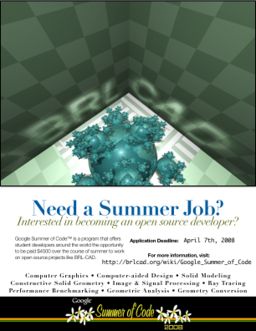Difference between revisions of "Google Summer of Code"
(clean up the preamble) |
(→Getting Started: smaller image since it's now out of date) |
||
| Line 21: | Line 21: | ||
=Getting Started= | =Getting Started= | ||
{|align="right" | {|align="right" | ||
| − | |[[Image:brlcad_gsoc2008_flyer.jpg|thumb|left| | + | |[[Image:brlcad_gsoc2008_flyer.jpg|thumb|left|256px]] |
|} | |} | ||
Revision as of 19:16, 13 March 2009
BRL-CAD has applied to participate in the 2009 Google Summer of Code.
Organization selections for 2009 will be announced on March 18th.
If we are accepted, a notice will be made first to the brlcad-news mailing list.
See our 2009 GSoC page for anticipatory details.
Overview
Since 2005, Google has run an open source software development program specifically for students called the Google Summer of Code (GSoC). Under this program, Google funds students to write code for open source projects during the northern hemisphere's summer timeframe. The student efforts are focused on projects that they themselves propose to projects such as BRL-CAD, sometimes catering to ideas that the project suggests or ideas entirely of the student's own conception. Student proposals are then reviewed, evaluated, and ranked by the project mentors. Google allocates a certain number of slots to each participating project/organization which in turn determines how many student developers we get to work with.
Previous years BRL-CAD has participated
GSoC 2008
Getting Started
- Read this page
- Read our Project Ideas
- Read our Application Guidelines
- Read our Development Requirements
- Interact on the #brlcad Freenode IRC channel
- Interact on the mailing list
- Submit a patch (optional but strongly encouraged)
- Prepare an application, discuss and share with mentors
- Apply between March 18 and April 3
Preparing an application
There is intentionally no specific format to our applications. BUT... students are strongly encouraged to be detailed, creative, and interactive with the BRL-CAD developers throughout the application process. Proposals that are detailed in their approach and contain useful background information about the individual's abilities and their ideas will generally receive more attention. Applications should specify what they intend to deliver, a reasonable development timeline, and any implementation details that are relevant such as what language(s) are intended to be used. See our Application Guidelines for more details.
Early proposal submission are encouraged as it gives us more time to review the proposal in detail, comment on it, potentially ask for additional input, and iterate with the student on their ideas. Submitting closer to the deadline isn't necessarily a negative consideration as all submissions are predominantly judged on merit, but submitting and discussing early is an advantage for submissions that have similar goals.
Students should propose what they actually want to work on, how they intend to work on it, what they intend to DO, what they know about that task, some details about themselves, etc. Their ability to perform the task is outright presumed by the nature of submitting a detailed application. Students should propose a task that they are comfortable and knowledgeable with performing within the timeframe of the program and considering any extenuating circumstances.
The application selection process
Just about every GSoC project receives considerably more project proposals than can be accepted. Each proposal is reviewed, evaluated, and critiqued. Of those applications, only a small subset are selected so keep in mind that the selection process is rather competitive and difficult. This cannot be stressed enough.. It remains rather hard for most projects to narrow down the submissions but in the end we all only have so many slots to work with and the line eventually has to be drawn. Every application gets read multiple times and reviewed in detail. We thank everyone that submits a proposal to work on BRL-CAD.
In the end, submissions are selected according to the overall long-term impact that accepting the proposal can make, perception of the submitter's abilities to complete the task within the program timeframe, general consensus on the technical approach being proposed, and overall interest in having such modifications made to BRL-CAD. Particular notice is made of students that are responsive to questions and readily interactive in the IRC channel or on the mailing list. Communication is a good thing.
Students are expected to interact on the #brlcad IRC channel on the Freenode network, abide by the HACKING rules, agree to the Development Requirements, and focus on providing a clean maintainable implementation.
Thanks for your interest and we look forward to seeing students apply!
